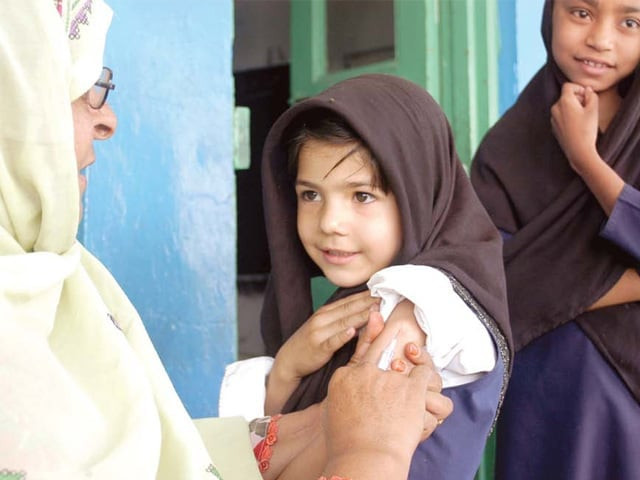Battling measles in the wake of the floods
WHO says around 95 per cent of flood survivors have been vaccinated against measles.

Kehkashan, who lives in a village near the town of Dadu, says she is very worried. “She [her daughter] also has a fever and the midwife I took her to see is not certain what it is. We are now going to take her to the clinic.”
Midwives double as basic healthcare providers in many rural areas, where facilities are scarce, reports IRIN, the UN information unit. Thomas Gurtner, the principal humanitarian adviser for the UN in Sindh, says the death of 11 children by measles has been confirmed by Dadu’s health officials.
The officials have ordered more vaccination centres to be opened in hospitals and for the vaccination drive at flood relief camps to be stepped up.
Eshtewi Abu Ziyad, World Health Organisation (WHO) acting representative in Hyderabad, says they have started a campaign against measles, including a vaccination drive that began before Eidul Azha on November 17. The drive is still gong on but they are also discussing plans and how to proceed with the help of Unicef and local health authorities.
“I am not sure yet if the disease [measles] is totally under control. I think a few more cases have been reported and we are assessing the situation,” Ziyad adds.
Around 4,000 children have been vaccinated against measles in the past two weeks. Ninety-five per cent of displaced people have been vaccinated and Ziyad says conditions are improving.
Measles has been killing up to 58 children a day in Pakistan and incidents continue to be reported from across the country. The WHO estimates 2.1 million children are infected annually, resulting in approximately 21,000 deaths each year due to complications.
“The best means to prevent measles is immunisation, immunisation and immunisation. Other important means are improved nutrition and doses of vitamin A, which improves our immune response,” recommends Gul Afridi, WHO media and advocacy officer in Islamabad.
The flood has only worsened the situation. When so many people are forced to live very close to each other at camps, levels of hygiene are poor and nutrition not always adequate, there is a greater chance of all contagious illnesses spreading, explains Abdul Ahmed, a physician in Dadu.
Lack of awareness plays a role too. “I had no idea measles could be dangerous. My three children, all under 10, are not vaccinated but after hearing about the risks on TV I have planned to take them to a clinic for their shots,” says Nizam Saeed, 35.
According to the WHO, other than the deaths in Dadu, there have been eight cases of measles in Ghotki district, 20 in Dadu, 11 in Kashmore and three in Naushero Feroz district. Outside Sindh, one case has been reported from Khyber-Pakhtunkhwa.
Reporting by IRIN-Asia (a project of the UN office for coordination of Humanitarian Affairs)
Published in The Express Tribune, November 25th, 2010.


















COMMENTS
Comments are moderated and generally will be posted if they are on-topic and not abusive.
For more information, please see our Comments FAQ